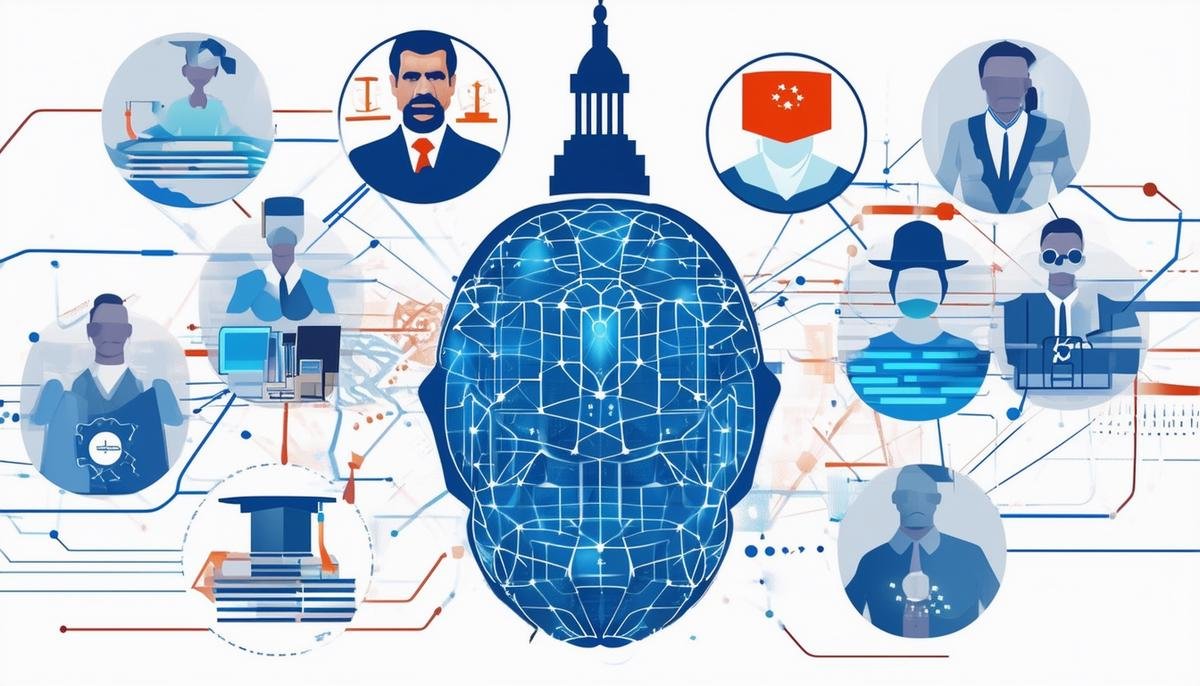Artificial General Intelligence (AGI) signifies a remarkable advancement in technology, striving to emulate the broad cognitive capabilities of humans. Unlike narrow AI, which excels in specific tasks, AGI aspires to handle a diverse range of activities with human-like versatility. This shift could transform various sectors, offering novel possibilities and challenges alike.
Understanding Artificial General Intelligence
Artificial General Intelligence (AGI) represents a new frontier where machines achieve an all-encompassing cognitive ability akin to humans. In contrast to narrow AI, which specializes in tasks like image recognition or language processing, AGI aims to replicate the versatility of human thought. Narrow AI is your specialized toolbox, excelling at precise, defined tasks. Need to translate a document or analyze customer data? Narrow AI handles it adeptly. However, if the situation deviates from its established path, it falters. AGI, conversely, is your Swiss Army knife, flexibly shifting between tasks and learning to problem-solve in varied domains, much like a human.
Current AGI research is in an exciting, albeit nascent state. Progress has been steady, driven by funding and advanced computer systems. OpenAI, for example, has been making strides with models like GPT-3 and GPT-4 that inch closer to AGI capabilities. They still fall short of true AGI, which would require continuous learning and adaptability without predefined boundaries.
The potential of AGI is immense. Picture automated systems designing more effective drugs, participating in high-level strategic planning, and learning from every experience. This technology could revolutionize sectors from healthcare to finance, liberating human potential and creativity from routine tasks. However, as promising as AGI is, it also carries risks. Misaligned AGI systems could produce unintended consequences, from economic disruption to privacy invasion. To mitigate these risks, researchers focus on safety and ethical frameworks, ensuring AGI aligns with human values and societal norms.

Educational Strategies for AGI Readiness
To prepare students for an AGI-driven future, educational institutions must pivot from traditional teaching models to innovative strategies that incorporate AGI-related topics into their curricula. One crucial aspect is the integration of personalized learning pathways, which cater to individual student needs and adapt content dynamically. This approach ensures that students learn at their own pace and receive tailored instruction.
Critical thinking is another fundamental component of AGI readiness. Developing critical thinking skills enables students to approach problems from multiple angles, making them adept at navigating complex, ambiguous situations. Educational programs should emphasize analytical skills, logical reasoning, and problem-solving to help students tackle the kinds of challenges that AGI systems cannot easily solve.
Experiential learning plays a pivotal role in preparing students for an AGI-dominated landscape. Hands-on experiences such as internships, collaborative projects, and simulations provide practical insights that are difficult to gain through theoretical study alone. These experiences reinforce theoretical knowledge and enhance cognitive and practical skills, making students more adaptable and innovative.
Incorporating these educational strategies requires a collaborative effort between educational institutions and industry partners. Professional development programs for educators should also be prioritized, equipping teachers with the knowledge and skills to effectively integrate AGI-related topics into their teaching.
Furthermore, ethical considerations and societal impacts of AGI must be a central part of the curriculum. By instilling these values early on, educational institutions can help shape conscientious leaders who are prepared to use AGI for the greater good.

Skill Development for the AGI Era
To thrive in an AGI-driven world, individuals must focus on developing several key skills that span both technical and soft domains. On one hand, technical proficiency in AI, data analytics, and programming is indispensable. Familiarity with machine learning, neural networks, and natural language processing allows individuals to engage with AGI tools more effectively, whether in developing new applications or managing existing systems.
Beyond mere familiarity, an in-depth understanding of data analytics is crucial. The ability to interpret and leverage large data sets is invaluable. Skills in statistical analysis, data visualization, and model evaluation empower individuals to draw actionable insights, optimize processes, and make informed decisions. Mastery of programming languages like Python, R, and SQL further enhances one’s ability to manipulate and analyze data.
While technical skills lay the foundation, soft skills add a critical dimension to thriving in an AGI era. Adaptability is a foremost requirement. In a rapidly evolving landscape, the ability to pivot and embrace new technologies swiftly can be a game-changer. Continuous learning and an intrinsic motivation to stay informed about AGI advancements enable individuals to remain relevant and competitive.
Emotional intelligence (EI) is another pivotal skill. As AGI systems handle more analytical and routine tasks, human interactions and collaboration will become more essential. EI encompasses self-awareness, empathy, and social skills, which are critical for fostering teamwork and building strong professional relationships.
Ethical decision-making is also paramount in the context of AGI. Individuals must cultivate a solid foundation in ethical principles, considering both the immediate and long-term consequences of AGI deployment. Training in ethical frameworks helps in making responsible choices that align AGI innovations with human values.
Additionally, creativity and problem-solving abilities distinguish individuals who can leverage AGI effectively. Cultivating an innovative mindset enables individuals to identify unique opportunities for AGI application, driving progress in various industries. Problem-solving skills ensure that complex issues, which AGI may not fully resolve, are addressed with ingenuity and critical thinking.

Ethical and Societal Implications of AGI
The rise of AGI presents significant ethical challenges and societal implications that demand our attention. One primary concern revolves around data privacy. Ensuring sensitive personal information is collected, stored, and used responsibly is paramount. Organizations must adopt stringent data privacy measures and transparent data governance frameworks to build public trust.
Job displacement is another crucial issue as AGI automates tasks, potentially rendering certain job categories obsolete. Reskilling and upskilling initiatives will be critical in helping individuals adapt to new roles that leverage human creativity, emotional intelligence, and complex problem-solving capacities.
The potential misuse of AGI poses risks if used irresponsibly or maliciously. Robust regulatory frameworks are essential to oversee AGI deployment and usage, preventing misuse while promoting innovation and societal benefit. Codifying ethical principles and establishing oversight mechanisms can help mitigate risks while encouraging responsible development.
Leadership plays a pivotal role in navigating these ethical and societal challenges. Leaders must champion ethical standards, advocate for policy measures that align AGI development with societal values, and foster a culture of accountability and transparency.
Interdisciplinary collaboration is vital for addressing AGI’s multifaceted challenges. Bringing together experts from diverse fields ensures a comprehensive approach to understanding and mitigating AGI’s impacts.

Government and Corporate Roles in AGI Preparation
Governments and corporations are pivotal in steering society toward a future where AGI is seamlessly integrated and ethically managed. Their roles span policy-making, education, implementation, and collaboration.
Corporations have begun initiatives like ADVANTA(I)GE INDIA, aimed at equipping people with AI skills. Such programs demonstrate commitment to fostering a skilled workforce capable of harnessing AI’s potential responsibly and making AI education accessible to underserved communities.
Policies for responsible AI development are crucial in mitigating AGI risks. Governments must establish comprehensive regulatory frameworks that guide the ethical development, deployment, and usage of AGI systems, addressing issues from data privacy and security to bias mitigation and accountability.
Public-private partnerships (PPPs) play a significant role in advancing AGI preparation. These collaborations leverage the strengths of both sectors, driving large-scale educational initiatives, funding critical research, and developing robust policy frameworks. Initiatives like Microsoft’s partnership with India’s Ministry of Skill Development and Entrepreneurship exemplify how such collaborations can drive meaningful impact.
Governments can foster a culture of continuous learning and adaptability by funding research and innovation in AGI and associated fields. Research grants, innovation hubs, and incubation centers can serve as conduits for groundbreaking AGI advancements.
Corporate social responsibility (CSR) initiatives also bolster AGI preparedness. Companies can invest in community-centric programs that raise awareness about AI, provide educational resources, and support underserved populations.
Lastly, leadership within both government and corporate spheres is essential. Leaders must advocate for ethical AI practices, invest in human capital, and champion policies that align technological advancement with public good. By fostering a culture of accountability, transparency, and inclusion, leaders can navigate the complexities of AGI development and deployment, ensuring that its benefits are maximized while its risks are minimized.

- Grace K, Salvatier J, Dafoe A, Zhang B, Evans O. Viewpoint: When will AI exceed human performance? Evidence from AI experts. J Artif Intell Res. 2018;62:729-754.
- Ganguli D, Sowcik M, Camerer C, et al. Increasing the economic viability of AI research. Sci Am. 2021;324(2):26-31.
- Gruetzemacher R, Dorner D, Berwind K, Paradice D, Azgaden J. Forecasting paradigm change in artificial general intelligence. Sci Rep. 2020;10(1):17456.
- Akhtar N, Mian A. Threat of workplace automation: Implications for career choice, skill demand, and training. J Bus Res. 2022;141:92-107.
- Chae S, Kwon S. Inclusive governance for AI-driven smart mobility. Transp Policy. 2022;125:273-285.




